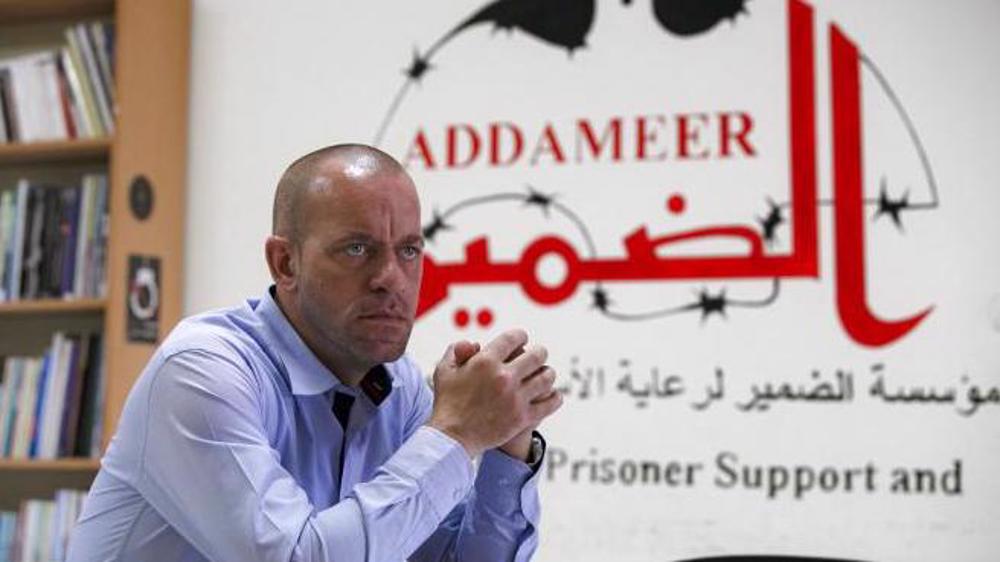Prominent Palestinian rights lawyer goes on hunger strike in Israeli prison
Prominent French-Palestinian human rights lawyer Salah Hamouri has joined a mass hunger strike in protest at his detention without charge by Israel for more than half a year.
The 37-year old rights lawyer was arrested on 7 March at his home in the Kufr Aqab neighborhood in occupied East al-Quds, where Israeli forces entered his bedroom, and grabbed him from his bed while still sleeping at dawn. He has since been held in prison under the so-called Israeli policy of "administrative detention".
Hamouri has been on strike against the controversial measure since Sunday, along with 29 other administrative detainees.
According to sources, Israel extended Hamouri’s detention the first time in June, over alleged links to the Popular Front for the Liberation of Palestine (PFLP). On 5 September his detention was extended for another three months. Hamouri denied any links to PFLP.
Hundreds of Palestinian prisoners are currently being held under the administrative detention policy. Through administrative detention, Israel imprisons Palestinians without trial or charge. The Israeli regime keeps the detainees without charge for up to six months; a period which can be extended indefinitely.
A researcher with the Palestinian prisoners’ rights NGO Addameer, the rights lawyer has spent a total of eight years in Israeli prisons over different periods, for his political activism.
The #JusticeforSalah campaign said Hamouri, who is being held in the maximum security prison Hadarim, has been moved into solitary confinement in a 2x2 square meter cell with no windows and a 10-centimetre mattress.
Earlier in October 2021, Israeli authorities revoked Hamouri's East al-Quds residency, denying him the right to live in his home town, which Israel captured in 1967.
“The Israeli occupation…neither sees us nor treats us as human beings with the same rights to liberty as any other free person. Instead, it does its utmost to keep our pseudo-lives in check, when we, Palestinians, are not being kept behind prison walls,” he wrote in an opinion piece for Middle East Eye in July.
Hamouri’s wife Elsa Lefor, who is a French National, and their two children have not been allowed to visit him or speak to him over the phone since his arrest.
30 prisoners, including Hamouri, declared their hunger strike against their indefinite, unfair and unexplained imprisonment at the hands of the Tel Aviv regime on Sunday, saying their collective detention amounted to 200 years.
They issued a statement saying “It has been hundreds of years, during which the occupation prevented us from embracing our families or seeing our children as they were born or growing up. We never celebrated their birthdays; we did not accompany them on their first school day.”
“Our demands are fresh air, clear skies without prison bars, a space of freedom and being able to meet our families at the dining table,” they pointed out, noting “We barely have air to breathe.”
Although the use of administrative detention in a widespread and systemic manner is prohibited under international law, the Israeli occupation uses administrative detention as a tool for collective punishment against Palestinians.
Palestinian prisoners are kept under deplorable conditions lacking proper hygienic standards. They have also been subjected to systematic torture, harassment, and repression.
The Tel Aviv regime carries out administrative detention on orders from a military commander and on the basis of what it describes as ‘secret’ evidence. Some prisoners have been held in administrative detention for up to 11 years.
There are reportedly more than 7,000 Palestinians held in Israeli jails. Palestinian detainees have continuously resorted to open-ended hunger strikes in an attempt to express outrage at the detentions.
Human rights organizations say Israel violates all the rights and freedoms granted to prisoners by the Geneva Convention. Amnesty International has described Israel’s administrative detention policy as a “cruel, unjust practice which helps maintain Israel’s system of apartheid against Palestinians.”
The United Nations and the International Committee of the Red Cross (ICRC), as well as many human rights group have frequently expressed serious concern about health condition of the prisoners on hunger strike.
Eight Palestinians killed as Israel attacks Gaza school, hospitals
VIDEO | Rome, Milan host new protests in solidarity with Palestinians
Dec. 21: ‘Axis of Resistance’ operations against Israeli occupation
Spain jurists demand ties with Israel ties be cut
VIDEO | Press TV's news headlines
VIDEO | Iran honors top Science Olympiad medalists
VIDEO | Austrians arrested at Gaza protest in Vienna
10 killed in bus crash in western Iran










 This makes it easy to access the Press TV website
This makes it easy to access the Press TV website